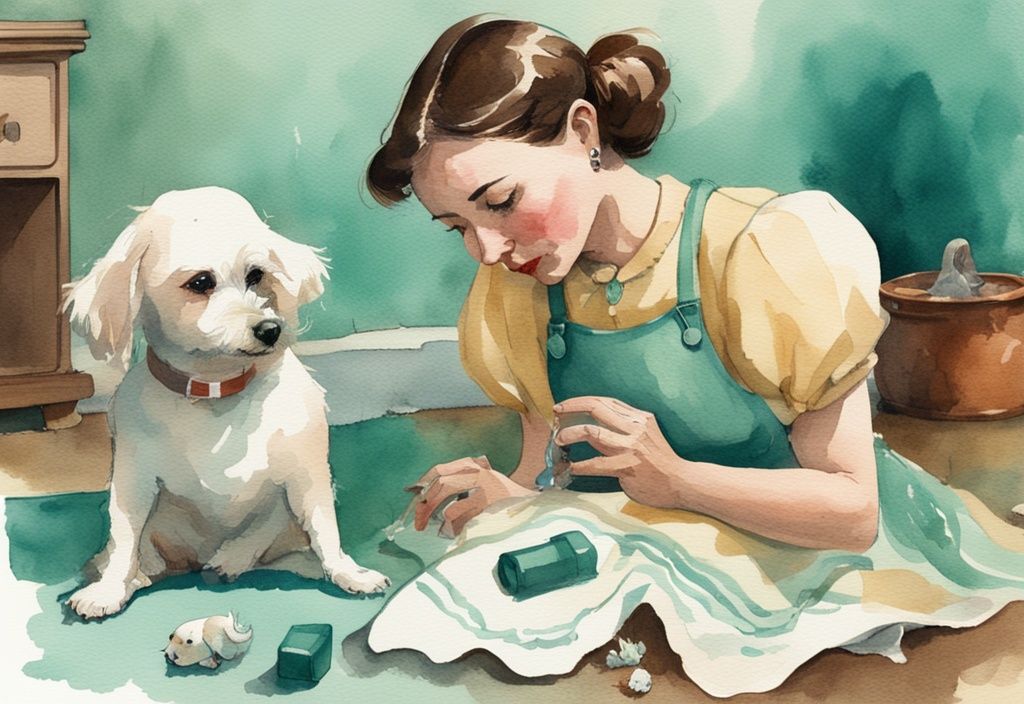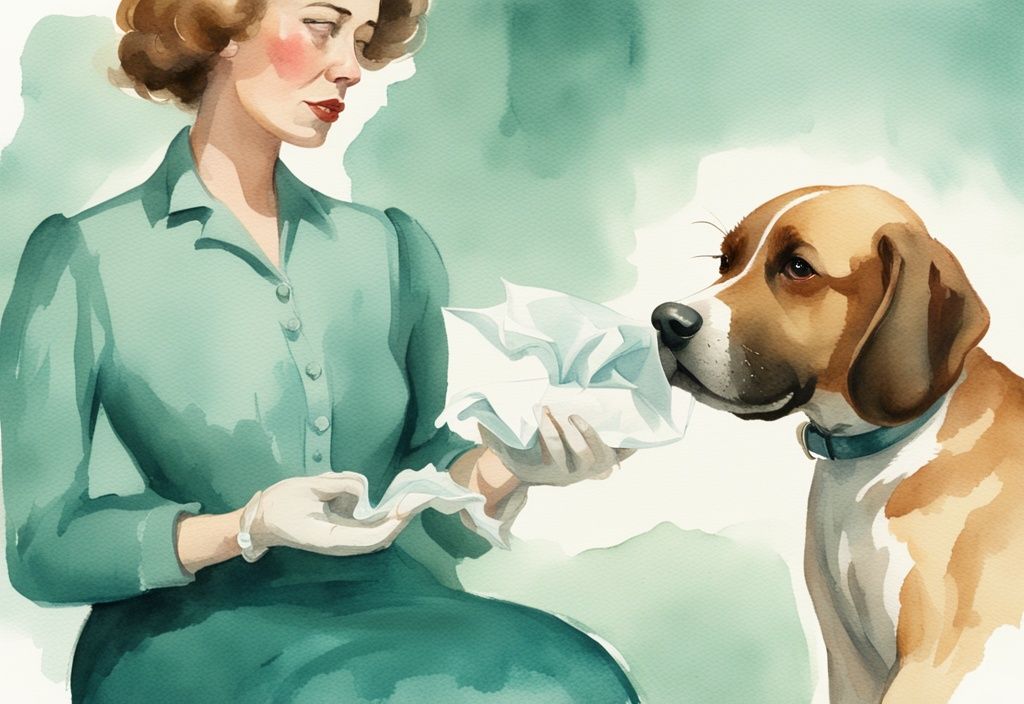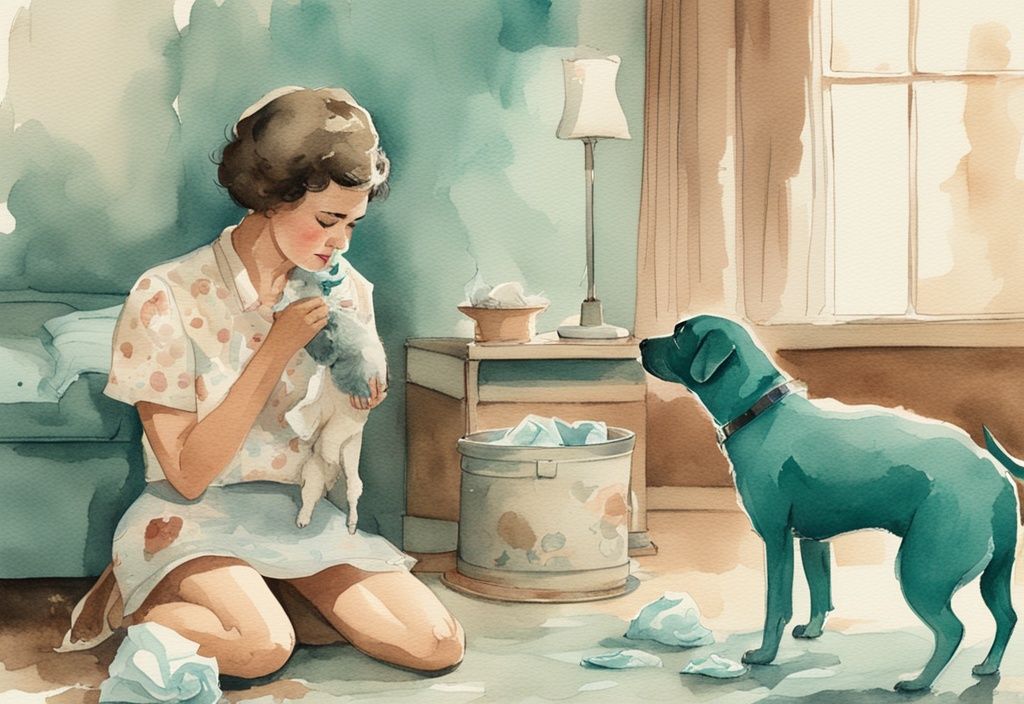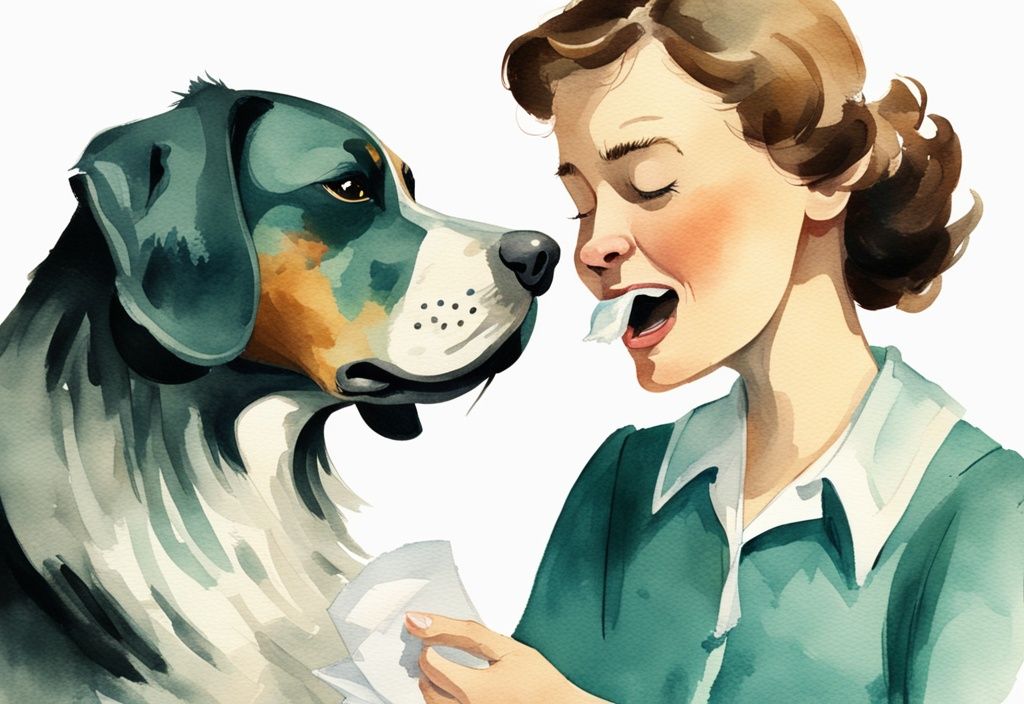Ever been caught off guard by your dog’s sudden sneezing episode and wondered, “Why does my dog keep sneezing?” It’s not just a cutesy habit or tickle in their snout. It can signify something more.
As a fellow dog lover, I’ve been there, puzzled and worried about my own furry friend’s frequent sneezes. This persistent sneezing could underline issues that need immediate attention. So, let’s dive in together to unravel the mystery behind our dogs’ sneezing and unearth practical solutions to ensure their health and happiness.
In this guide, we’re exploring a world of environmental irritants, potential allergies, infections and more. With a careful balance of knowledge and empathy, you’ll discover the many potential triggers for your pup’s sneezing and learn effective ways to manage, prevent and ultimately keep your pooch in sneeze-free bliss. Hold that treat, dear reader. We’re about to embark on a healthful journey with our four-legged friends.
When Should Dog Sneezing be a Cause for Concern?
Every now and then, a sneeze here or there from your furry friend is nothing to worry about. But if your dog keeps sneezing, there are some crucial signs to watch for, suggesting it’s time to head to the vet. Let’s dive into the specifics:
Signs That Suggest Urgent Veterinary Attention
- Bloody Nasal Discharge: Spotting blood in your pup’s nasal discharge can be quite alarming. This could hint at severe infections, trauma, or even tumors. A visit to the vet is a must to pinpoint the cause and start the right treatment.
- Frequent or Uncontrollable Sneezing: A quick sneeze once in a while? Totally normal. But if your dog keeps sneezing non-stop, it might be more than just an irritant – think infections or foreign objects stuck in their nasal passages.
- Nose Bleeds: An active nosebleed is serious business. It could be from trauma, nasal tumors, foreign bodies, or other systemic issues. Either way, it’s time to see the vet to avoid any complications.
-
Continuous Sneezing: When your dog’s sneezes just won’t quit, it’s a sign something’s off – maybe an infection or something they’ve inhaled. Don’t wait; get them checked out pronto.
En este video, aprenderás sobre las causas de los estornudos en los perros y cuándo es necesario consultar a un veterinario si tu perro estornuda con frecuencia. - Thick Nasal Discharge That is Yellow, Green, or Bloody: The color and thickness of nasal discharge can clue you in on possible infections. Thick, discolored mucus often points to bacterial or fungal issues that need a vet’s touch.
- Acting Unwell or Showing Lethargy: If sneezing is paired with your dog seeming down or lethargic, it could signal a more serious, systemic problem. A thorough vet check-up is definitely needed.
- Noticeable Changes in the Shape of the Nose or Facial Swelling: Any physical changes like swelling or a misshapen nose might be signs of advanced infections, injuries, or tumors. Such notable symptoms demand immediate veterinary attention.
- Difficulty Breathing: Pair sneezing with breathing troubles, and you’re looking at possible blockages, severe infections, or respiratory distress. This is a clear signal to see your vet right away.
- Lack of Appetite: Noticing a sudden drop in your dog’s appetite along with frequent sneezing? This red flag can indicate a variety of health concerns, from illnesses to discomfort caused by nasal issues.
Keeping an eye on these symptoms and seeking timely veterinary help ensures that any serious health problems behind your dog’s sneezing are tackled swiftly. Your furry buddy’s well-being is worth that extra attention!
Decoding the Common Reasons Behind Frequent Dog Sneezing
When it comes to our furry companions, sneezing can be a signal of various issues. Understanding the underlying causes can help ensure your dog stays healthy and happy.
Environmental Irritants: A Common Culprit
If you’re asking, “Why does my dog keep sneezing?” environmental irritants could be the answer. Dogs are often sensitive to airborne particles like pollen, dust, and mold. Household items, including scented candles, cleaning products, air fresheners, and perfumes, can also trigger sneezing fits. Smoke and other pollutants in the air may cause respiratory irritation. It’s important to keep your home clean and free from strong scents to minimize these triggers.
Impact of Allergies on Your Dog’s Sneezing
Allergies are another common response to the question, “Why does my dog keep sneezing?” Dogs can be allergic to numerous substances, such as certain foods, plants, dust mites, or materials. Seasonal allergies caused by pollen or outdoor mold spores can make your dog sneeze more during specific times of the year. Conversely, food allergies usually trigger sneezing within hours of eating. Consulting with a vet to identify specific allergens and manage your dog’s allergies can significantly reduce sneezing.
Sneezing Due to Inhalation of Foreign Bodies
A more immediate and alarming cause of “Why does my dog keep sneezing?” could be the inhalation of foreign bodies. Dogs sometimes inhale grass, leaves, seeds, food particles, foxtails, or small sticks, leading to persistent sneezing and discomfort. If you suspect that your dog has inhaled something, prompt veterinary care is crucial to safely remove the object and prevent further complications.

Nasal Infections and Increased Sneezing
Infections are also a potential answer to “Why does my dog keep sneezing?” Conditions such as canine distemper, kennel cough, or other upper respiratory infections can cause frequent sneezing. Additional symptoms may include coughing, a runny nose, and cold-like signs. Infections caused by bacteria or fungi can be particularly serious, resulting in colored or bloody nasal discharge. If you notice that your dog is dry heaving but acting normal, it may be worth exploring potential underlying causes. Learn more. Timely veterinary intervention is essential for proper treatment and recovery.
Dental Problems Causing Your Dog to Sneeze
Sometimes, dental issues might be the reason behind “Why does my dog keep sneezing?” Problems such as tumors, abscesses, rotten teeth, or infections in the upper jaw can cause inflammation or pain, leading to sneezing. Regular dental check-ups are vital for identifying and addressing these issues. A thorough dental exam by a vet can diagnose these problems and provide the right treatment, significantly reducing your dog’s sneezing.
By understanding these common reasons, you can better identify why your dog keeps sneezing and take appropriate steps to ensure their health and well-being.
Understanding Different Types of Dog Sneezing
Sneezing in dogs can be intriguing. Each type of sneeze tells its own story, from harmless fun to potential health concerns.
Frequent Vs. Occasional Sneezing: Know the Difference
Dogs sneeze for many reasons, from minor irritations to significant health issues. If my dog keeps sneezing occasionally, it’s often due to fleeting irritants like dust, mild allergens, or even a stray blade of grass. These occasional sneezes are typically not a cause for concern and are just your pup’s way of keeping its nasal passages clear.
On the other hand, frequent sneezing can signal a more serious issue. If my dog keeps sneezing frequently or if the episodes worsen, it’s time to pay attention. This kind of persistent sneezing, particularly if it comes with nasal discharge, blood, or difficulty breathing, should prompt a visit to the vet. Persistent sneezes could indicate infections, allergies, foreign bodies, or even serious conditions needing medical attention.
What is Play Sneezing?
Play sneezing is such an endearing quirk in dogs, often showing how happy and excited they are. When dogs are having a blast—be it during games, with other dogs, or with their favorite humans—sneezing can come naturally. High-pitched and frequent, if my dog keeps sneezing during play, it’s usually just having a wonderful time. This type of sneezing is benign and typically stops once the play session ends, so no worries here!
How Does Reverse Sneezing Manifest in Dogs?
Reverse sneezing is one of those peculiar dog behaviors that can be startling but is often harmless. It looks like a series of rapid, forceful inhalations through the nose, which can sound quite alarming. Common triggers include excitement, nasal passage irritation, or inflammation. If my dog keeps sneezing in this reverse manner, it generally just needs a few moments to calm down and the episode will pass.
However, if these episodes occur frequently, it might be wise to consult a vet. Persistent reverse sneezing can point to irritants or underlying issues such as nasal mites or infections. A vet can help identify the cause and provide the necessary treatment if my dog keeps sneezing in this unusual way.
How to Diagnose Chronic Sneezing in Dogs
When you find yourself continually pondering, “Why does my dog keep sneezing?” it’s comforting to know there are proven methods veterinarians use to diagnose what’s going on with your furry friend. These diagnostic procedures ensure that any persistent sneezing is properly understood and treated, so your pup can be back to their happy, healthy self.
Common Tests and Procedures Used by Veterinarians
Physical Examination: The first step when your dog is constantly sneezing is often a thorough physical examination. Vets take a close look at your dog’s nose, throat, and overall health. They’re on the lookout for any signs of infection, inflammation, or foreign bodies, as well as assessing your dog’s general condition.
Blood Tests: Blood tests can identify underlying systemic conditions that might be causing your dog’s sneezing. It’s like a detective tool, uncovering infections, allergies, or immune responses that might be at play, while also giving a broader picture of your dog’s health.
Radiographs (X-rays): X-rays provide non-invasive images of the nasal passages and surrounding areas, helping vets to detect abnormalities, foreign objects, or infections inside the nasal cavity.
CT Scans: For a more detailed examination, CT scans offer comprehensive images of the nasal structures. These are particularly effective for spotting structural issues, tumors, or detailed abnormalities that might not show up on X-rays.

Rhinoscopy: Rhinoscopy involves using a small, flexible scope with a camera to visually inspect the nasal cavity. This is the vet’s way of getting a direct look inside your dog’s nose to check for tumors, foreign bodies, and more, even collecting tissue samples if needed.
Culture and Sensitivity Tests: When infections are suspected, culture and sensitivity tests help identify the specific bacteria or fungi causing the problem. This ensures your dog gets the most effective treatment, tackling the sneezing at its source.
If you’re wondering why is my dog acting weird, understanding these diagnostic methods can empower you to address the issue of “my dog keeps sneezing” with your vet. Discovering the root cause through these comprehensive tests ensures a precise diagnosis and the right treatment, ultimately improving your dog’s health and well-being.
Treating Your Sneezing Dog: A Comprehensive Guide
Understanding why your dog keeps sneezing is essential to provide the appropriate care. From environmental irritants to serious health conditions, there are various reasons behind a dog’s sneezing. This guide dives into some common causes and remedies to help your furry friend find relief.
How to Deal with Environmental Irritants
If your dog keeps sneezing, it might be because of environmental irritants. These pesky triggers, like dust, smoke, and scented products, can make life uncomfortable for our canine companions. Imagine how frustrating it is for your dog! Start by identifying and removing potential irritants from your home. That new air freshener might smell lovely to you, but it could be what’s bothering your pet. Using air purifiers can also help keep the air cleaner and reduce the sneezing episodes. And remember, keeping your home smoke-free is not just good for you but essential for your dog’s respiratory health.
Managing Your Dog’s Allergies
Allergies can be another sneaky culprit when your dog keeps sneezing. Identifying specific allergens is the first step. Trust me, I’ve been through it with my own pup, and elimination diets can work wonders. You might also consider specialized allergy tests performed by your veterinarian. Once pinpointed, allergy medications or steroids prescribed by your vet can bring much-needed relief. Sometimes, a hypoallergenic diet makes a significant difference, especially if food allergies are to blame. Consistent monitoring and managing are the keys to keeping those sneezes under control.
Effective Ways to Handle Nasal Infections and Foreign Bodies
Nasal infections and foreign bodies can cause serious sneezing fits in dogs. If your dog keeps sneezing and you’ve ruled out other causes, it might be time to check for infections. Your vet might prescribe antibiotics or antifungal medications to tackle the problem. Now, if Fido’s taken a keen interest in sniffing around the yard, he could have inhaled something that’s now stuck in his nose, causing relentless sneezing. Don’t try to remove it yourself! Leave that to the professionals to avoid complications.
Addressing Dental Issues to Reduce Sneezing
Believe it or not, dental problems can be another reason your dog keeps sneezing. Issues like abscesses, tumors, or infections in the upper jaw can lead to nasal inflammation. Regular dental check-ups and cleanings are a must to maintain those pearly whites and overall health. If any dental issues are detected, timely treatment through extractions, surgeries, or medications can make a world of difference. Keeping up with your dog’s dental health is as important as it is for us, and it can help in reducing sneezing linked to these issues.
Treating Serious Conditions like Nasal Tumors
Nasal tumors are a more severe cause of chronic sneezing in dogs. If your veterinarian identifies a nasal tumor, surgical removal may be necessary. For malignant tumors, chemotherapy or radiation therapy might come into play. Regular monitoring and diligent follow-up care are critical. Early detection and appropriate treatment can improve outcomes and ensure your dog’s quality of life. Never ignore persistent sneezing, especially if accompanied by other symptoms like facial swelling or breathing difficulties. Your vet is your best ally in such serious cases.
Practical Home Remedies and Care Tips for Your Sneezing Dog
How a Cool-Mist Humidifier Can Help
If you notice that my dog keeps sneezing, one helpful remedy is using a cool-mist humidifier. This device works wonders in alleviating nasal congestion by keeping your dog’s airways moist. Particularly beneficial during dry seasons or when indoor air is arid, a humidifier can provide much-needed relief and make breathing easier for your pup.
Regular Cleaning and Vacuuming: A Simple Sneezing Solution
Another effective strategy to consider when my dog keeps sneezing is regular cleaning and vacuuming. By maintaining a clean environment, you significantly reduce the presence of dust, pollen, and other irritants that can trigger sneezing. Make it a habit to regularly wash your pet’s bedding, as this is a common area where allergens can accumulate. This simple housekeeping routine can make a big difference in minimizing your dog’s sneezing episodes.
Steps to Remove Known Irritants from Your Dog’s Environment
Removing irritants from your dog’s surroundings is crucial if my dog keeps sneezing. Start by avoiding the use of strong-smelling cleaning products and air fresheners, as these can aggravate your dog’s nasal passages. Additionally, ensure that smoking is done outside and away from your pet to prevent exposure to smoke and its harmful effects. Regular grooming is also essential to remove outdoor allergens such as pollen or dust that can cling to your dog’s fur. By taking these proactive steps, you can create a healthier, sneeze-free environment for your dog.
Prevention is Better than Cure: Regular Check-Ups and Vaccinations
How Regular Veterinary Visits can Prevent Sneezing
When you notice that “my dog keeps sneezing,” it’s essential to prioritize regular vet visits. These routine check-ups are like a safety net, catching potential health issues early. Imagine your dog happily trotting into the vet’s office for a thorough screening—it’s all about nipping problems in the bud. Vets can spot allergens or infections before they flare-up, ensuring your pup stays happy and healthy. These visits aren’t just about treating symptoms; they’re about fostering a proactive approach that tailors treatments to your dog’s unique needs.
Preventive Care to Keep Your Dog Sneezing-free
Preventive care plays a pivotal role in keeping sneezing at bay. Regular immunizations act like a superhero’s shield against common respiratory infections that often set off those sneezing fits. Just like you wouldn’t skip your dentist appointments, maintaining your furry friend’s dental health is crucial too. Dental issues can surprisingly lead to sneezing, so those check-ups are a must. And let’s not forget, dodging known allergens and irritants—think specific foods, dust, or even pollens—can greatly cut down the chances of sneezing bouts. Keep these triggers at bay, and your dog’s snout will thank you.

Conclusion
When you’re noticing that your dog keeps sneezing, it’s important to consider various factors and issues as outlined throughout this guide. We’ve discussed the signals that indicate when sneezing should be a cause for concern, uncovered common reasons behind frequent sneezing, and delved into different types of sneezing, as well as approaches for diagnosis and treatment.
Monitoring your dog’s symptoms is crucial. Persistent sneezing, especially when accompanied by other symptoms like discharge, nosebleeds, or changes in behavior, should prompt a visit to the veterinarian for a thorough examination. Early detection and treatment can prevent minor issues from developing into more serious conditions.
Preventive care plays a vital role in keeping your dog healthy and sneeze-free. Maintaining regular veterinary check-ups, ensuring up-to-date vaccinations, and avoiding known irritants can make a significant difference. Good dental hygiene, managing allergies, and maintaining a clean environment further contribute to your dog’s well-being.
Remember, any ongoing or worrying symptoms should always be evaluated by a veterinarian. By staying vigilant and proactive, you can ensure that your furry friend enjoys a happy and healthy life, free from the discomfort of incessant sneezing.
FAQ
What Immediate Actions Should I Take If My Dog’s Sneezing Persists?
- If your furry friend keeps sneezing, it’s important to get a sense of what might be causing it. Start by observing and documenting when and how often it happens. Got a notebook or a note-taking app? Jot it down!
- Next, think about any new changes in your dog’s environment. Did you switch to a new cleaning product or introduce a new plant? Try removing potential irritants or allergens to see if that helps.
- Of course, sometimes sneezing isn’t just a simple irritation. If the sneezing persists, it’s definitely time to schedule a visit to the vet for a thorough check-up. They can provide a professional evaluation and peace of mind.
Are Certain Breeds More Prone to Sneezing?
- Brachycephalic breeds, like Bulldogs and Pugs, often deal with sneezing more frequently because of their adorable but smushed noses. It’s just one of those quirks that come with their unique anatomy.
- On the other paw, breeds with longer noses can also have their own sneezing woes, especially if they inhale something they shouldn’t or develop a nasal infection.
How Can I Differentiate between Normal Sneezing and a Serious Problem?
- Generally, your pup might sneeze now and then due to minor irritants like dust. This kind of sneezing is short-lived and nothing to worry about.
- But, if you notice frequent, persistent sneezing accompanied by symptoms like nasal discharge, blood, or breathing difficulties, it can be a sign of a more serious issue. In such cases, getting a vet’s advice is crucial.
Can a Particular Diet Cause My Dog to Sneeze More Often?
- Surprisingly, yes! Food allergies can sometimes trigger sneezing in dogs. If you suspect this might be the case, consider discussing hypoallergenic diets with your vet.
- It might be a journey of trial and error, but eliminating specific ingredients could make a world of difference to your pup’s comfort.
What Should I Do if I Suspect My Dog Inhaled a Foreign Object?
- If you think your dog has inhaled something they shouldn’t have, it’s crucial not to try to remove it yourself. This can be dangerous for both of you.
- Instead, seek immediate veterinary care. They have the proper tools and experience to safely handle the situation.
